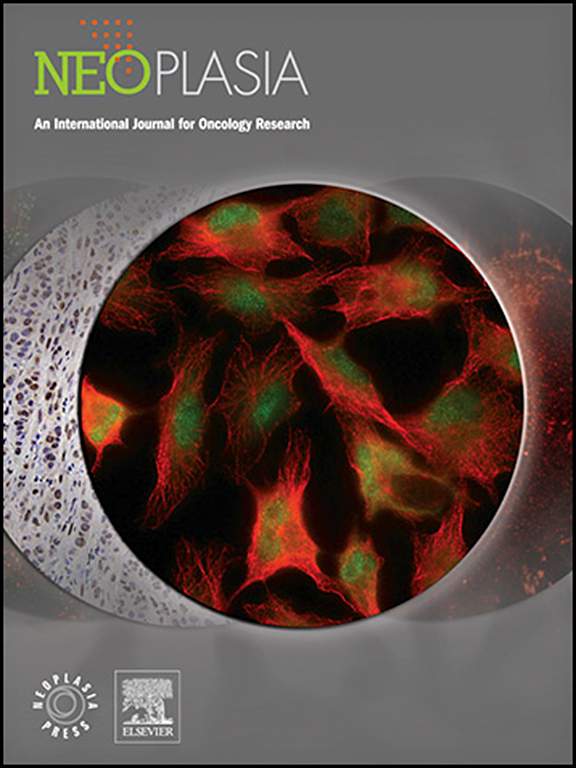FAM111B通过上调LDHA促进糖酵解,促进前列腺癌转移
IF 7.7
2区 医学
Q1 Biochemistry, Genetics and Molecular Biology
引用次数: 0
摘要
背景转移性前列腺癌(PCa)预后不良给患者和医疗保健系统都带来了沉重的负担。FAM111胰蛋白酶样肽酶B (FAM111B)与多种癌症的发生和进展有关,但其在PCa中的作用尚不清楚。方法从皮下转移瘤和肺转移瘤中提取原代细胞,通过伤口愈合实验、Transwell实验、软琼脂集落形成实验和体内肺转移改造实验验证转移电位的差异。通过转录组学联合分析、蛋白质组学分析、实时荧光定量聚合酶链反应和western blot检测,鉴定转移性前列腺癌(mPCa)相关关键差异表达基因FAM111B。通过基因富集分析、葡萄糖摄取、乳酸和ATP含量测定及糖酵解应激试验分析FAM111B对高转移性PCa细胞糖酵解能力的影响。结果fam111b在转移性PCa细胞中高表达,与不良临床特征相关,可上调LDHA,促进糖酵解。机制上,FAM111B功能编码区编码的水解三联体可抑制P27的表达,激活Cyclin-CDKs/RB/E2F1经典信号通路,促进LDHA的转录和蛋白表达。结论FAM111B高表达与前列腺癌的不良临床特征有关。FAM111B蛋白结合并水解P27蛋白,激活Cyclin-CDKs/RB/E2F1信号通路,增加LDHA的表达,从而增强糖酵解能力,最终促进PCa的转移,可能成为治疗转移性PCa的新靶点。本文章由计算机程序翻译,如有差异,请以英文原文为准。
FAM111B enhances glycolysis and promotes metastasis of prostate cancer by upregulating LDHA
Background
The poor prognosis of metastatic prostate cancer (PCa) poses a major burden on both patients and the healthcare system. FAM111 trypsin-like peptidase B (FAM111B) is related to the development and progression of a wide array of cancers, but its role in PCa remains poorly understood.
Methods
Primary cells were extracted from subcutaneous and pulmonary metastatic tumors and were used to verify differences in metastatic potential through wound healing assay, Transwell assay, soft agar colony formation assay, and in vivo pulmonary metastasis reformation assays. The key differentially expressed gene FAM111B related to metastatic prostate cancer (mPCa) was identified through transcriptomic combination analysis, proteomic analysis, quantitative real-time fluorescent polymerase chain reaction and western blot assays. The effect of FAM111B on the glycolytic capacity of PCa cells with high metastatic potential was analyzed by gene enrichment analysis, glucose uptake, lactate and ATP content measurement assays, including glycolytic stress test.
Results
FAM111B was highly expressed in metastatic PCa cells and associated with adverse clinical features, which upregulated LDHA to enhance glycolysis. Mechanistically, the expression of P27 was inhibited by a hydrolytic triad coded by the functional coding region of FAM111B, which activated Cyclin-CDKs/RB/E2F1 classical signaling pathway to promote the transcription and protein expression of LDHA.
Conclusions
The high expression of FAM111B is associated with adverse clinical features of PCa. FAM111B protein binds to and hydrolyzes P27 protein, which activates Cyclin-CDKs/RB/E2F1 signaling pathway to increase LDHA expression, thereby enhancing the glycolytic ability and ultimately promoting the metastasis of PCa and may potentially serve as new targets for the treatment of metastatic PCa.
求助全文
通过发布文献求助,成功后即可免费获取论文全文。
去求助
来源期刊

Neoplasia
医学-肿瘤学
CiteScore
9.20
自引率
2.10%
发文量
82
审稿时长
26 days
期刊介绍:
Neoplasia publishes the results of novel investigations in all areas of oncology research. The title Neoplasia was chosen to convey the journal’s breadth, which encompasses the traditional disciplines of cancer research as well as emerging fields and interdisciplinary investigations. Neoplasia is interested in studies describing new molecular and genetic findings relating to the neoplastic phenotype and in laboratory and clinical studies demonstrating creative applications of advances in the basic sciences to risk assessment, prognostic indications, detection, diagnosis, and treatment. In addition to regular Research Reports, Neoplasia also publishes Reviews and Meeting Reports. Neoplasia is committed to ensuring a thorough, fair, and rapid review and publication schedule to further its mission of serving both the scientific and clinical communities by disseminating important data and ideas in cancer research.
 求助内容:
求助内容: 应助结果提醒方式:
应助结果提醒方式:


